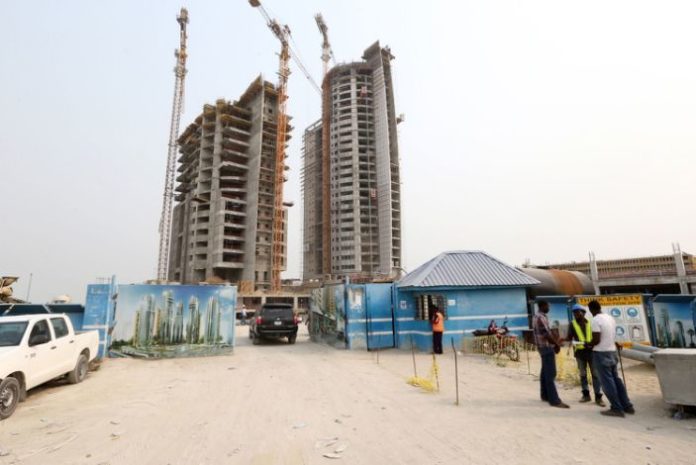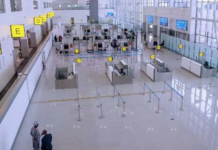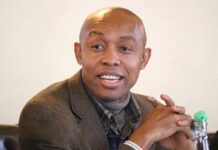They come from the countryside, from the villages, from the capital city or from neighboring countries — energetic, ambitious, full of hope that they’ll find jobs and a community and better lives. Few find what they come for. Yet they keep coming.
Not to London or New York, but to Lagos, the Nigerian urban sprawl that’s an unrivaled magnet for people, in Africa or anywhere. A city of less than 1.5 million in 1970, Lagos is growing so fast that population estimates vary by more than 10 million. The Lagos Bureau of Statistics says it’s 26 million now, the federal government says it’s 21 million, and international institutions put it at around 15 to 16 million.
By the end of the century, Lagos will grow to 88 million, making it the world’s largest city, according to the University of Toronto’s Global Cities Institute. Nigeria could be the third-largest country by then. With a housing deficit of 2.5 million units, more than two-thirds of Lagos’s residents live in slums that are among the least hospitable on Earth, according to Leilani Farha, the United Nations Special Rapporteur on housing.
“People are living in some of the worst, if not the worst, conditions I’ve seen in the world, and I’ve been to all the big slums in India, Kenya, South Africa,” Farha said during a visit to the country in September. While most government officials agree the affordable housing shortage is a crisis, they have little idea how to respond.
“The aim of making housing readily available, accessible and affordable for the low- and middle-income earners who form the bulk of our citizenry had always been challenged by the ever-growing population of the state,” Moruf Akinderu-Fatai, the Lagos state commissioner for housing, said in a Dec. 8 speech. “We see many people trooping into Lagos in search of economic opportunities on a daily basis with no intention of going back.”
New apartment towers are rising in Lagos, but they’re intended for foreign oil workers and the small group of Nigerians who can obtain mortgages or afford to pay cash, not the families crowded into crumbling units with seven to a room and limited access to clean water and sanitation.
Developers’ focus on high-end units amid a shortage of affordable housing mirrors that of builders in cities around the world — from Berlin to London to New York and Hong Kong.
The most ambitious project is Eko Atlantic, a city within a city that’s being built on a Lower Manhattan-sized stretch of land reclaimed from the Atlantic Ocean. Its builders plan a boulevard modeled on Paris’s Champs-Élysées and it will house around 250,000 people in luxury apartments, while the U.S. will move its Lagos consulate there.
Read More: Dream of a Lagos Champs-Élysées banks on Nigerian recovery
With vast oil and mineral wealth, Nigeria has the 29th-largest economy in the world, just behind Norway’s. While Africa’s richest man, Aliko Dangote, mainly lives in Lagos, Nigeria also has the highest number of people classified as extremely poor — defined as living on $1.90 or less per day — at about 87 million of the country’s 200 million residents, according to the Brookings Institution.
Even for Nigeria’s emerging middle class, there are few options.
Kalu Ndukwe, a water-plant engineer, was desperate to find a new home for his family. His landlord failed to make repairs and his apartment was plagued with leaks. He can earn as much as 580,000 naira ($1,600) per month — which would put him in roughly the top third of the population in salary, though as a freelancer, his pay is inconsistent.
‘Many Challenges’
He paid an agent for a three-bedroom flat on the western edge of Nigeria’s — and Africa’s — biggest city. When he arrived with his wife and three children, someone else was already living there. He managed to get a refund, but his troubles continued when the owner of the next property rejected him because he was from the wrong ethnic group.
“There were so many challenges,” said Ndukwe, 40.
After two years, Ndukwe found a home he and his family liked and had a landlord who, like him, was an Igbo. The rent was 500,000 naira a year. And he had to give the agent a 50% commission and pay for the whole year in advance, which actually represents an improvement in Lagos, where landlords used to commonly demand two or even three years up front.
Lagos is one of the fastest-growing cities in sub-Saharan Africa and so far the only one of more than 10 million — the threshold for a megacity — though several others, including Kinshasa in DR Congo, Luanda in Angola and Johannesburg in South Africa, aren’t far behind.
For proponents of faster economic development, this should be a sign that Africa is finally getting its chance to catch up to the developed world.
But even as urbanization accelerates and third-world megacities proliferate, it’s no longer a direct route to greater prosperity and the rise of a middle class that it was when industrial revolutions swept Europe and North America in the 19th century or transformed the economies of countries such as South Korea and China in the 20th.
To serve as engines of greater productivity and development, cities need affordable housing, reliable public transportation, public health services, education and other basic services. Without those, megacities impede economic growth rather than promote it.
“All of these together help make cities more productive, engines of economic growth,” said Shlomo Angel, a professor of city planning at New York University. “One of the setbacks in Lagos is that the economy is fragmented, it’s not integrated. People live in small communities” so without decent transportation or housing, “the number of jobs you can reach is based on how far they can walk.”
Continued failure to provide adequate housing, sanitation and transportation robs Nigeria of its greatest resource, its human capital.
“Nigeria has such a vibrant culture,” said Meredith Preston McGhie, secretary general of the Global Centre for Pluralism. “They are artists and musicians and entrepreneurs and they are full of energy. In the right conditions they are a formidable workforce.”
For foreign investors, particularly those wanting to sell consumer goods, Nigeria’s young, rapidly growing population of 200 million should be a major attraction. But many are put off by the poor infrastructure, including the scarcity of housing.
“Investors won’t come if housing isn’t available for their workers — they’ll just bypass Nigeria,” said Marja Hoek-Smit, the founder of the International Housing Finance Program at the Wharton School of the University of Pennsylvania, and who’s worked extensively in Africa. “Economic growth is very affected by this lack of affordable housing. It means cities are a mess, inefficient and costly to live in. That, ultimately, means industrialists have to pay more for labor.”
Government Programs
Most government efforts so far have been designed to help people buy homes with government mortgages. Few could qualify because a 30% down payment was required for the 10-year loan, according to Akinderu-Fatai, in a speech this month. So the government introduced a rent-to-own program.
“The prospective homeowners make only a 5% down payment, take possession and pay up the remaining balance with as little interest as possible as rent towards the ownership of the property over a period of 10 years,” Akinderu-Fatai said.
Very few Nigerians have access to home loans from banks. There are only around 50,000 home mortgages in the entire country. And with Nigerian inflation in double digits, most lenders that do provide home loans charge at least 20%, according to a Nigerian central bank survey.
“If you don’t have normal access to finance, you won’t get mass development of housing,” says Wharton’s Hoek-Smit. “Developers are not going to build if they can’t sell upon finishing buildings.”
The World Bank estimates Nigeria has a deficit of 17 million housing units, one of the largest globally. It would cost around $363 billion to build that many homes, according to the Centre for Affordable Housing Finance in Africa, a Johannesburg-based think tank.
The government should begin with the basics, said the U.N.’s Farha. It should prioritize improving informal settlements by giving people the right to live there and upgrading infrastructure, she said. That way they would lose their fear of being evicted by police, who regularly raze slums, and invest in their communities.
“They would be quite happy to band together and put up a roof and a wall and build a drain,” she said.
.Bloomberg














